Railway
Lagos to Ibadan rail: Proof of pudding is in the eating
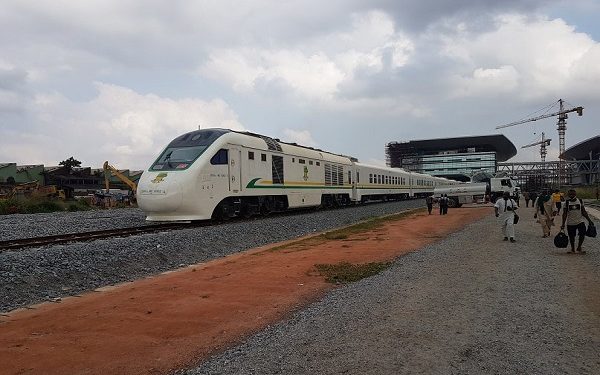
Life is gradually returning to the rail track leading from Lagos to Ibadan, the Oyo State capital. PAUL ADE-ADELEYE shares his experience
After much talk, some animosity and a burst of determination, the Lagos to Ibadan rail line finally kicked off activities low-key on December 7. Although its maiden trip was mocked for recording generally low patronage, the fault did not lie with the quality of service on offer; neither did it lie, contrary to popular opinion, with the fare of commuting. A return journey to and from Ibadan last week Wednesday, turned out to be exhilarating.

- Train host/hostesses
Everyone has said it, so it is no secret that none of the train stations on the 156km route is complete at the moment. The closest to completion is the Lagos terminal at Ebute Metta in Lagos Mainland. When completed, the terminal has been touted to match international standards. A cursory glance at the level of work ongoing at the station seems to point to the absence of any fib on the part of those who believe that the new terminal will be of high quality. Awaiting the comfort of the new terminal, however, Lagos District Manager of the Nigeria Railway Corporation (NRC), Jerry Oche, took it upon himself to ensure that travellers were well treated.
Inviting the first five travellers to arrive at the Lagos Station to the conference room of the old terminal last Wednesday, the manager fielded questions and even served drinks, apologising that the waiting area and ticketing booth were not ready. One traveller wondered aloud why there was little publicity concerning how the train would work, especially as most travellers simply had to grope their way through the procedure leading up to boarding the train. Mr Oche, an engineer, however, revealed that the absence of fanfare and advertorial that would serve as official publicity for the commencement of the train service was deliberate.
Officially, the train service has not been commissioned. This will be done by President Buhari sometime in January by which time it is hoped the project would have been completed. Meanwhile, the bit-part launching of the train service means that with current operations, the train can sit as many as 580 people. At the moment, especially since the station is not completely ready and there is no secure waiting area, it may be difficult to manage such a number. Oche is reluctant to kick-start operations at full capacity when the facilities to manage such numbers are not yet completely available. For now, he appears content to let the train service announce itself, a strategy that appears to be yielding dividends.
The district manager is additionally confident that this can be a successful strategy because the train service had conducted a free trial from Iju to Ibadan and only the COVID-19 pandemic stopped the service. When the trial started, they recorded low turnout but soon the numbers skyrocketed and maximum patronage was recorded at every journey.
Facilities
The reporter arrived at the train station with the intent of travelling humbly. Humility must be understood to mean economy class. However, when the booking clerk would ask what class of commuting the reporter wanted, a strange whim caused the reporter to opt for first class.
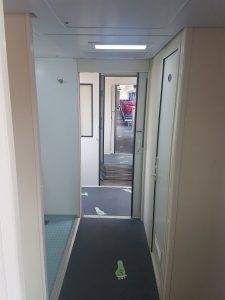
- The passage
The first-class coach, which seats 24 passengers, costs N6,000; the business class coach, which seats 56 passengers, costs N5,000; while the economy coaches cost N3,000 for the 68-seater coach and N2, 000 for the 88-seater coach.
Luxury is an addictive spirit, so let it suffice to say that the return journey was first class also. Whatever the financial effects of this deluxe treatment of self, the devil may care but the reporter does not. To purchase a train ticket, the prospective commuter must present some form of identification – no doubt for security purposes.
Despite the incompleteness of the rail station, the manager was keen on security. He mandated that only travellers were to be on the ramp leading up to the train during boarding hours. There are also contracted security personnel belonging to several paramilitary bodies who embark on every train ride for the safety of the passengers. No staffer without business on the train was to be in the vicinity. At the entrance of the train, courteous staff (a welcome improvement in Nigeria) greeted the passengers, and the train not to be outdone, also breathed a cheeky draught of cold air. The trip, this implied, would be fully air-conditioned. The train was not complaining, the employees were not, and the passengers certainly were not. That consensus being reached, the reporter did not begrudge the train hostess leading him to the first class session – he paid for it anyway. There were sinks on the train, restrooms and a mini-bar from which nourishment was to be served for the pleasure of travellers.
Cross-checking this array of amenities with a contact in the United Kingdom confirmed that the regular metro trains do not offer this luxury. Only the long-distance trains, which operate between counties, do. While the economy and business class carriages looked comfortable enough, the reporter cannot say much for them, having only passed through. The first-class coach, however, was what it promised. The seats had trays, which could be summoned or neatly tucked away according to the traveller’s preference. The seats could also be rotated a full 360 degrees should the traveller not enjoy the sensation of being in reverse as the train rolls along. Trains, you see, hardly turn. There are engines at both ends, which propel the train depending on the train’s direction, and so the traveller is either travelling backward or forward.
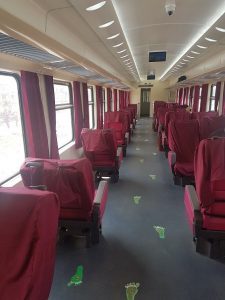
- Interior of the First Class coach
At exactly 4 pm, the train departed the station. The passengers had been warned that the trip would last 2:41 hours. There are stations in Agege, Alagbado, Kajola, Abeokuta, Papalanto, Olodo, Omi Adio and finally Moniya, Ibadan, but for now, only the Abeokuta station is a stopping station. The stop was for only five minutes, and, as promised, at exactly 6:41, the train rolled into the Ibadan station. Similarly, the next morning, the train departed Ibadan by exactly 8 am and was in Ebute Metta at exactly 10:41 am. At maximum speed, the train is expected to eat up the distance at the rate of 150km/hr. The precision was encouraging for it meant a fellow could work his schedule around the train schedule. Mr Oche noted that when the train service became fully operational, it could make as many as 16 trips daily with a train departing and arriving every other hour. The journey could have been shorter, but people trading on the rail lines have forced the train to virtually crawl through Lagos, picking up speed from Alagbado station.
Verdict
For the current prices, the Lagos-Ibadan rail service is worth the expenditure. As noted by many analysts, the advantages floor whatever financial inconvenience the traveller may experience. For N2,500, the commuter who has chosen economy class will get more than double the comfort that a traveller by road would hope to enjoy in public transport. The traveller again enjoys additional guarantee that they will arrive at their destination in one piece and at a pre-arranged time. The business class traveller, for only N5,000, will enjoy more exclusivity and can make use of a laptop or other such device as may be reasonably sized for their work. It is presumed that the first-class passenger has called congress in his mind and deliberated on what premium can be placed on comfort and luxury in travelling. Honeymooners or those who do not like crowded spaces are advised to travel first class. It offers comforts that even luxurious private vehicles struggle to match.
The fear, as with many other things in Nigeria, is the maintenance culture. It was lack of proper maintenance and farsightedness that led to the decline of the railway system which the British bequeathed. The NRC must be careful not to rest on its oars but seek new and better ways to innovate rail travel, for only by so doing can the current pace be sustained and evenly matched. The District Manager predicts that by February, the stations will be completed. It is difficult to see how that is possible.
-The Nation
Railway
NRC ready for Lagos-Kano cargo train services – Opeifa
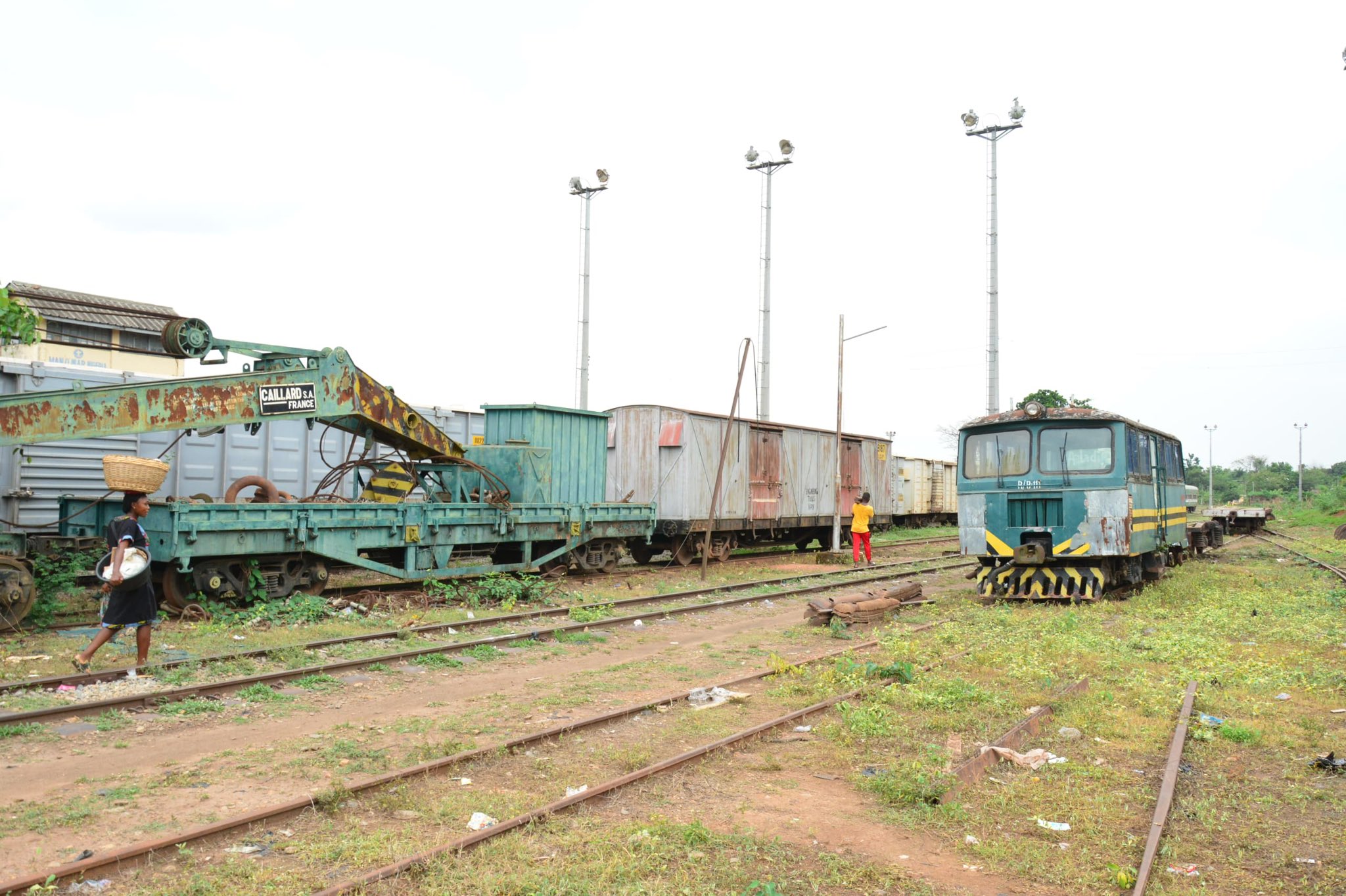
NRC ready for Lagos-Kano cargo train services – Opeifa
…says railway properties are national assets not scrap
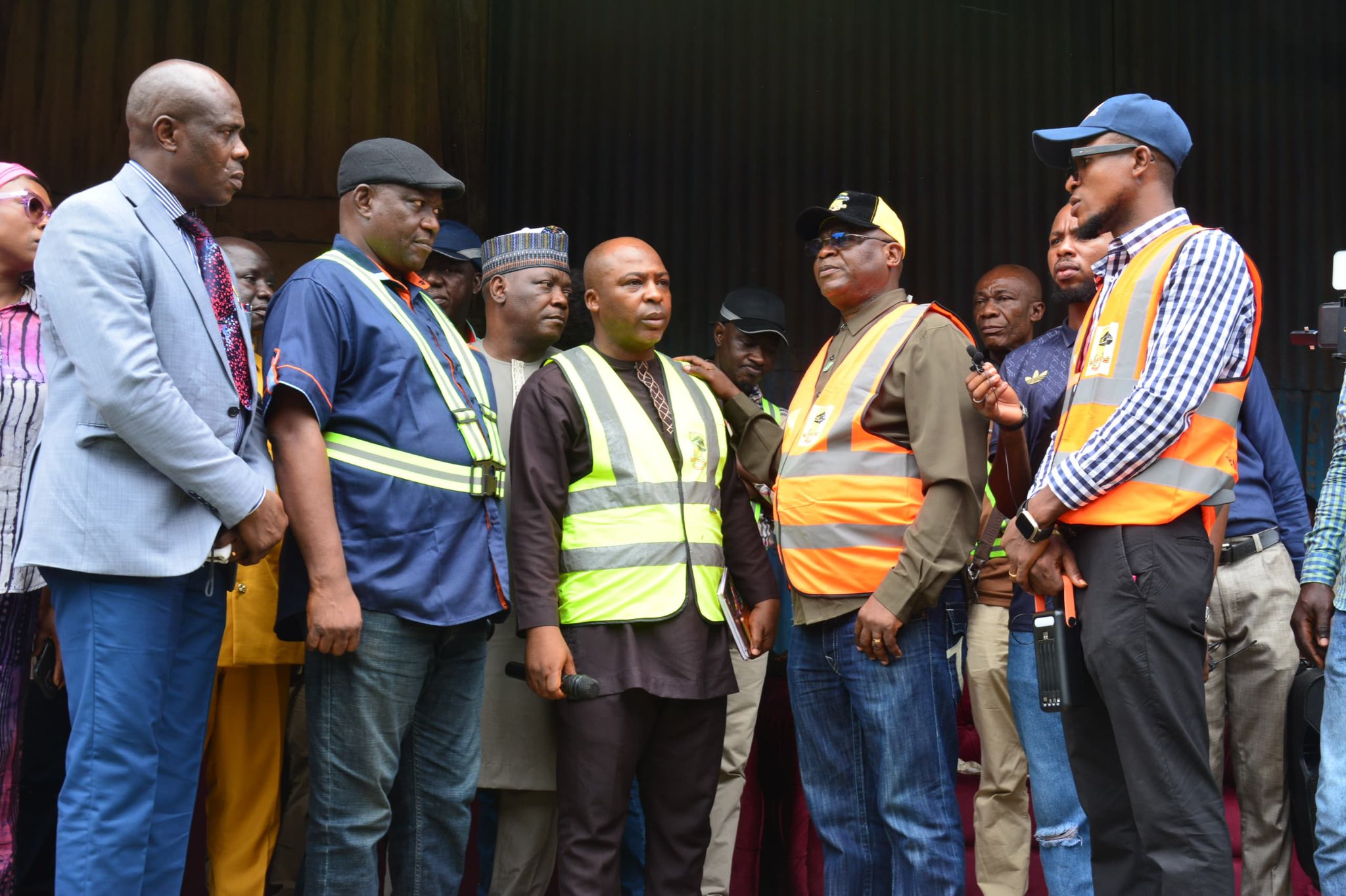
Managing Director of the Nigerian Railway Corporation Dr Kayode Opeifa has declared that the Western district is ready for cargo train movement between Lagos and Kano on the narrow gauge.
He stated this at Dugbe, the Ibadan Narrow Gauge Train Station, after inspecting Moniya Freight Park, in Ibadan, Oyo State, during the tour of operations on the Western Line, as part of his inspection of all districts which commenced on Friday.
The NRC MD also stressed that no property of the corporation should be seen as scrap but critical national assets that must be treasured, according to a statement released the NRC MD media team.
He said, “The essence of this tour is to enable us to access our readiness to handle the cargo side of our business as business and logistics facilitator.
“We are happy with the extent of what we have seen and we can comfortably say we are ready to move any manner of cargo for any of our customers.”
Opeifa had commenced the tour from the Mobolaji Johnson Train Station at Ebute Metta, Lagos, where he inspected the facilities available for passengers’ convenience.
At his next stop at Omi Adio, he inspected the facility being put in place to establish another cargo park there. He directed the acquisition of more land around the proposed dry port area to provide for anticipated business the dry port would be processing when the business finally comes on stream.
Opeifa was joined on the inspection at the Ladoke Akintola Train Station, Omi Adio, by the Director General of Development Agenda for Western Nigeria (DAWN Commission) Dr. Seye Oyeleye, who expressed the readiness to work with the NRC to reactivate the narrow gauge line within some of the states in the South-West for mass transportation.
The inspection took NRC boss and his management team to the Obafemi Awolowo Train Station, Moniya and the Moniya Cargo Park, where he inspected the readiness of the port to facilitate cargo business.
He also inspected the Western District Headquarters at Dugbe, Ibadan, where he charged the workers to double their efforts and improve the Internally Generated Revenue (IGR) of the railway.
“I can approve an improvement in your allowances once we improve our IGR. So let us be committed to doubling our efforts,” he said.
Opeifa said the management wt determined to recommence cargo commitment from Lagos to Kano, even as he said he would be at Ibadan to flag off the Dugbe end of the movement once the service begins.
He also commended all railway women, urging them to continue to prove their mettle in keeping the wheel of the rail going.
Addressing the welfare of pensioners, Opeifa said the corporation would continue to work at improving their welfare.
“I don’t need to be told, I can feel so many things and I can only assure you that the management will continue to work at improving your living conditions,” he said.
He reiterated his call for vandals to stop sabotaging the corporation’s effort at improving its services.
“Let me emphasize again that there are no scraps in the Nigerian Railway Corporation. All we have are rail materials. All our materials are in serviceable conditions.
“From here we are moving cement from Ewekoro to Osogbo and to Ilorin. All these wagons you see, all these rail sleepers, all the iron are still working and all security operatives have been directed to arrest and prosecute anyone caught vandalising our property.
“No one is permitted to carry our materials. No letter of approval is sufficient to allow anyone to do so, security operatives should put a call across to us to enable us authenticate such activity,” he said.
Railway
Lagos Govt to redesign Oshodi motor park for rail integration

Lagos Govt to redesign Oshodi motor park for rail integration
The Lagos State Government has announced plans to redesign the Oshodi Transport Interchange (OTI) to integrate the facility with the Red Line and Blue Line rail systems, advancing its Rail Mass Transit project.
This initiative aims to deliver seamless connectivity between the two key rail networks and enhance commuters’ experience in Lagos.
The disclosure was conveyed via a statement shared on the official X (formerly Twitter) account of the Lagos State Ministry of Transportation on Saturday, highlighting the need to optimize the design and operations of the OTI to boost efficiency and align with global standards.
READ ALSO:
- Nurse punished in UK for addressing convicted transgender paedophile as ‘Mr’
- Ex-LG chair challenges El-Rufai’s claims on council funds
- Some ladies in movie industry ready to sleep their way to fame — Jide Kosoko
To kickstart the process, the Honourable Commissioner for Transportation, Seun Osiyemi, held a meeting with stakeholders to assess the current state of the interchange and outline strategies for its improvement.
“The Ministry of Transportation sought to address the ongoing developments and challenges affecting the Oshodi Transport Interchange (OTI) in preparedness for the integration of the Rail Mass transit system; Red Line rail project connecting the Blue Line.
“The Ministry recognized that a review of the OTI’s design and operations is essential for its optimization which led to the Honourable Commissioner for Transportation, Oluwaseun Osiyemi meeting with relevant Stakeholders to discuss the current state of the OTI and identify viable solutions that would enhance its operational efficiency in alignment with global standards and Standard Operating Procedures,” the statement read in part.
Lagos Govt to redesign Oshodi motor park for rail integration
Railway
NRC to revive Lagos 2pm MTTS train as Opeifa tours districts
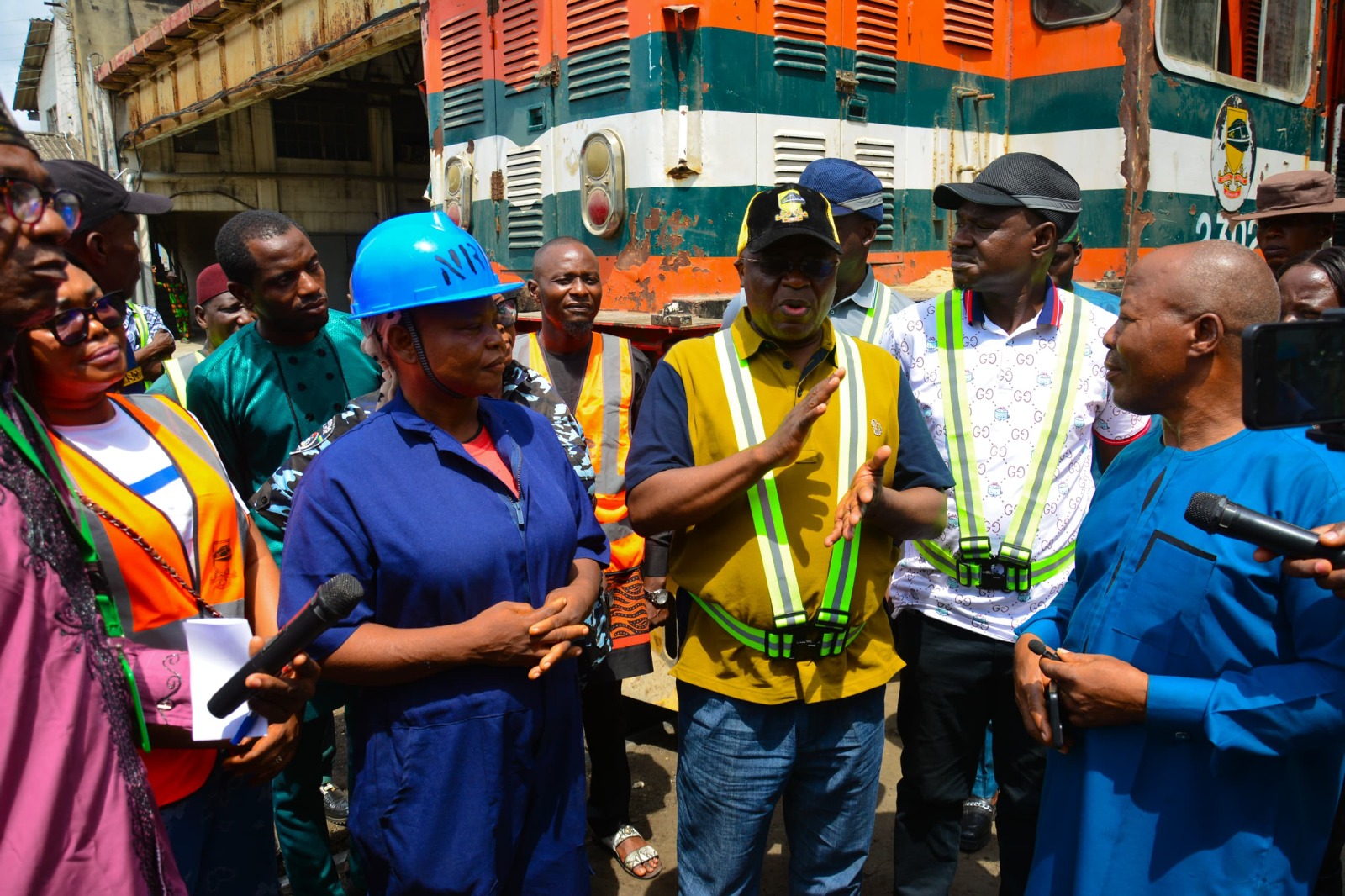
NRC to revive Lagos 2pm MTTS train as Opeifa tours districts
The Nigerian Railwaiy Corporation (NRC) will soon revive its Lagos 2pm mass transit train service (MTTS) in line with the demands of passengers.
Managing Director of the NRC, Dr Kayode Opeifa, disclosed in Lagos, assuring Nigerians of the readiness of the corporation to serve them better.
He spoke at the Iddo Train Station, while addressing train passengers commuting daily from Ijoko and other border communities in Ogun State to Iddo and Idumota axis of the Lagos Island.
A statement by the Deputy Director of Public Relations at the NRC, Mahmood Yakubu, quoted the MD as saying, “NRC management being aware of the centrality of the MTT Kajola to Iddo rail line to the continued prosperity of the Iddo, Idumota and some other big markets in Lagos will not only continue to sustain the line, but work to add addition service after careful commercial market viability and sustainability studies.”
Opeifa was at Iddo Station to assess the available space in preparation for upcoming developmental and revitalization initiatives.
According to him, the transformation of the Iddo Terminal is central to the corporation’s goal to significantly improve the terminal’s infrastructure, optimize its capacity and elevate the passenger experience
He also said the management would urgently embark on the rehabilitation of the coaches to improve the ambience of the interior of the trains and the Iddo stations for better customer experience and patronage.
Opeifa said he would not hesitate to terminate the contract of any contractor not willing or ready to add value to the corporation’s service.
The managing director, who spent some time going round the Iddo Station, also directed the installation of solar panels around the station to better improve the lightening condition, even as he sent the signal that a comprehensive review of all land leases around the station is underway.
Opeifa was nostalgic about the several interesting monuments and railway relics.
He called on corporate organisations and other philanthropists to support the corporation in the area of provision of conveniences for train passengers as part of their corporate social responsibility.
The Railway District Manager (RDM), Engr Augustine Arisa, and District Superintendent, Mrs Chidinma Mba, also informed the MD that the prosperity of the Idumota market is also related to the operations of the MTT line as any day the train does not run, the market feels it.
The NRC MD had earlier commenced his maiden tour of the NRC districts across the country, with a tour to the Running Shed of the corporation at Ebute Metta, which he learnt was a hub to other districts.
He expressed delight at the industry of ironmen (women engineers and technicians) working in the corporation who are competing with their male counterparts in ensuring that all the nation’s rolling assets are in serviceable conditions.
The tour took him to the store, where Opeifa directed that the management must commence the painting of several legacy buildings of the corporation across the country.
He added that the corporation was determined to improve its image as a frontline mobility service provider and the hub for logistics services in the country.
Opeifa who observed that there are no scraps in the railway, reiterated earlier calls on Nigerians to beware of anyone vandalizing the rail materials across the country, adding that security agencies especially the Nigeria Security and Civil Defence Corps (NSCDC) had been directed to prosecute anyone caught vandalizing any rail assets.
He said the corporation would put back to shape as many narrow gauge locomotives still serviceable and would deploy them across the country to serve passenger traffic anywhere the corporation had existing train lines just as the Federal Government would aggressively continue to invest and expand the national standard gauge corridor.
The tour also took the managing director to the Battery Room, as well as the laboratory, an inspection of all the mechanical fluids which was a crucial facility responsible for analyzing the quality and integrity of mechanical fluids used in NRC rail operations.
He assured the laboratory that the management under his watch would continue to support their growth and development as he himself trained and once worked as an analytical chemist.
The tour also took Opeifa to Agege Station where he had a closed door meeting with officials from the Lagos Metropolitan Area Transport Authority (LAMATA), led by the Director Rail Services Engr Olasunkanmi Okusaga, on how to firm up security challenges between the two stations Babatunde Raji Fashola Station and the Lagos State Train Station at Agege Station.
Opeifa who was led round by the Agege Station Manager, Mrs Ese Asowata, went round to check the station’s conveniences, the VIP Lounge, the control room, the ticketing lounge and administrative sections among others.
The managing director took time to address the concerns of some train passengers, one of them, Olatunde Apata, who complained of what could be done for any passenger who missed his train. Apata, who was heading to the Prof. Wole Soyinka Station, in Abeokuta, Ogun State, had missed his train because he went to pray.
Addressing all challenges Opeifa directed that under no circumstances should the ticket not work to relief passengers with disability access the train.
He equally said efforts were being made to see how the issue of those missing their train would be addressed even as he disclosed that the NRC and LAMATA were working at how to ensure passengers could co-switch and access the metro train to continue their journey from the stations.
-

 metro2 days ago
metro2 days agoRivers administrator Ibas fires Fubara’s political appointees
-

 metro2 days ago
metro2 days agoJUST-IN: Ex-Oyo gov Ajimobi’s first child Bisola dies At 42
-

 metro3 days ago
metro3 days agoHow ritualists, native doctor drugged, murdered underage sisters in PH – Police
-

 metro2 days ago
metro2 days agoFG declares public holidays for Eid-el-Fitr
-

 metro1 day ago
metro1 day agoEFCC re-arraigns son of ex-PDP chairman for alleged N2.2bn oil subsidy fraud
-

 Africa2 days ago
Africa2 days agoNiger coup leader sworn in as president for five years
-

 metro2 days ago
metro2 days agoNatasha: Murray-Bruce slams Atiku, defends Akpabio
-

 International2 days ago
International2 days agoAI will replace doctors, teachers, others in 10 years – Bill Gates



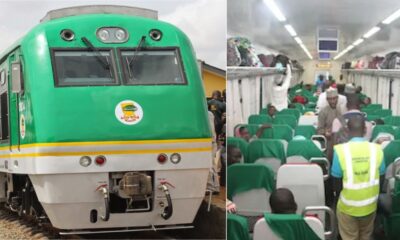

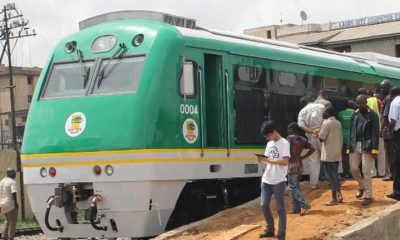




You must be logged in to post a comment Login